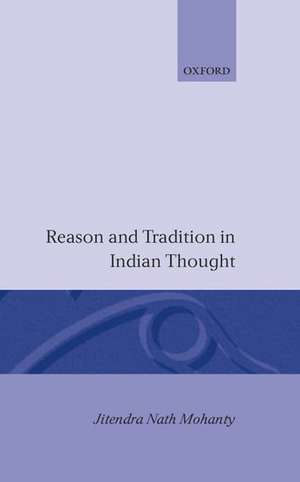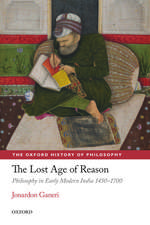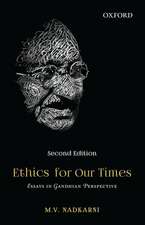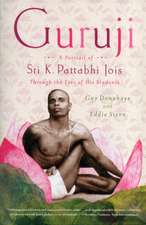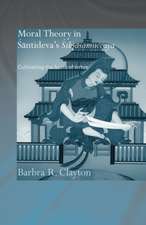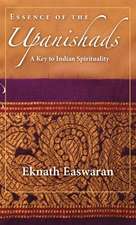Reason and Tradition in Indian Thought: An Essay on the Nature of Indian Philosophical Thinking
Autor Jitendra Nath Mohantyen Limba Engleză Hardback – 3 dec 1992
Preț: 656.21 lei
Preț vechi: 994.76 lei
-34% Nou
Puncte Express: 984
Preț estimativ în valută:
125.56€ • 131.45$ • 103.90£
125.56€ • 131.45$ • 103.90£
Carte tipărită la comandă
Livrare economică 26 martie-01 aprilie
Preluare comenzi: 021 569.72.76
Specificații
ISBN-13: 9780198239604
ISBN-10: 0198239602
Pagini: 316
Dimensiuni: 143 x 224 x 22 mm
Greutate: 0.48 kg
Ediția:New.
Editura: Clarendon Press
Colecția Clarendon Press
Locul publicării:Oxford, United Kingdom
ISBN-10: 0198239602
Pagini: 316
Dimensiuni: 143 x 224 x 22 mm
Greutate: 0.48 kg
Ediția:New.
Editura: Clarendon Press
Colecția Clarendon Press
Locul publicării:Oxford, United Kingdom
Cuprins
Indian philosophy, between tradition and modernity; Consciousness and knowledge; Language and meaning; The nature of Indian logic; Indian theories of truth: their common framework; The concept of being and the ontologies; Time, history, man, and nature; Remarks on the Praman Theory; The nature of Indian philosophical thinking
Recenzii
`a rich demonstration that for millennia Indian philosophers were grappling with many of the gritty issues which preoccupy twentieth century philosophers'Times Literary Supplement
'This book is an exciting and novel attempt to provide a new basis and method for comparative philosophy. Mohanty's presentation of the source material is superb, and his analyses are outstanding ... this is a most interesting book on Indian philosophy I have read in a while ... he is always a pleasure to read, always fascinating and inspiring. Above all, the book contains a great promise - its approach and methodology could rescue comparative philosophy from its current moribund state.'E. Franco, La Trobe University
'Mohanty writes and thinks here as an Indian philosopher engaging his tradition critically and insightfully, looking to find what is still alive and potentially creative within it. One of the most striking achievements of Mohanty's work is his ability to set forth clearly what is distinctive and valuable in Indian thought while being able to bring it in close relation to philosophy as conceived in the West. Mohanty's book would be a dismal failure if it turned out not to be provocative. Its remarkable success is assured by the stimulus it offers to one's own critical and creative thinking and the insight it offers into so many intricate issues and positions in classical Indian thought.'Eliot Deutsch, University of Hawaii, International Philosophical Quarterly, Vol. XXXIV, No.2, Issue No. 134, June 1994
'the book has a great deal that is important to say'Karl H. Potter, University of Washington, Journal of the American Oriental Society 1214.1 (1994)
An interesting and important contribution to the scholarship of Indian philosophy ... I believe the book has made an excellent case for treating Indian philosophy as philosophy ... it is required reading for anyone in the Western tradition concerned with Indian philosophy, and for anyone interested in pursuing the thesis of an incompatibility of Western and Indian philosophical thought.
'This book is an exciting and novel attempt to provide a new basis and method for comparative philosophy. Mohanty's presentation of the source material is superb, and his analyses are outstanding ... this is a most interesting book on Indian philosophy I have read in a while ... he is always a pleasure to read, always fascinating and inspiring. Above all, the book contains a great promise - its approach and methodology could rescue comparative philosophy from its current moribund state.'E. Franco, La Trobe University
'Mohanty writes and thinks here as an Indian philosopher engaging his tradition critically and insightfully, looking to find what is still alive and potentially creative within it. One of the most striking achievements of Mohanty's work is his ability to set forth clearly what is distinctive and valuable in Indian thought while being able to bring it in close relation to philosophy as conceived in the West. Mohanty's book would be a dismal failure if it turned out not to be provocative. Its remarkable success is assured by the stimulus it offers to one's own critical and creative thinking and the insight it offers into so many intricate issues and positions in classical Indian thought.'Eliot Deutsch, University of Hawaii, International Philosophical Quarterly, Vol. XXXIV, No.2, Issue No. 134, June 1994
'the book has a great deal that is important to say'Karl H. Potter, University of Washington, Journal of the American Oriental Society 1214.1 (1994)
An interesting and important contribution to the scholarship of Indian philosophy ... I believe the book has made an excellent case for treating Indian philosophy as philosophy ... it is required reading for anyone in the Western tradition concerned with Indian philosophy, and for anyone interested in pursuing the thesis of an incompatibility of Western and Indian philosophical thought.
